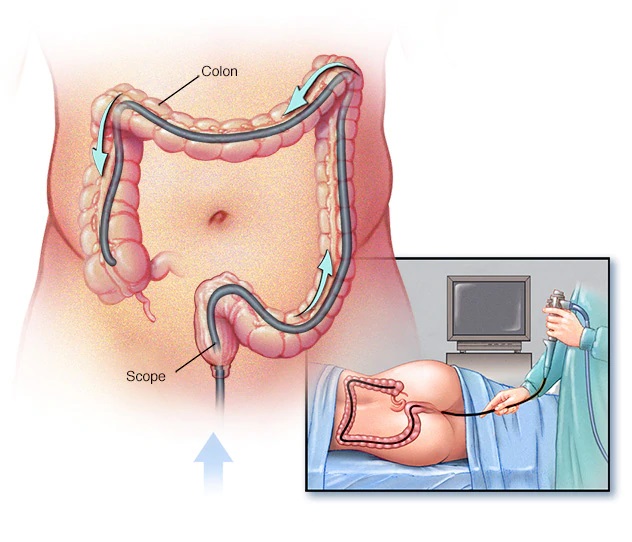Colonoscopy
- Home
- Colonoscopy
What is colonoscopy?
Colonoscopy is an endoscopic test to examine the mucosa (inner lining) of large intestine which is also called colon. The examination involves introducing a camera attached to a tube to be inserted in the back passage and then proceeding to look at the mucosa. It is usually done by a Physician who is trained in Endoscopy/Gastroenterology.
When should it be done?
1. Blood in stool or bleeding from back passage
2. Change in bowel habits
3. To investigate the cause of low Haemoglobin (Anaemia)
4. To investigate and obtain biopsies in case another test (eg. CT scan) suggests any abnormality in Colon
5. To look for Cancer or polyps in the colon.

Does one need any preparation before Colonoscopy?
Colonoscopy requires a special preparation and for this special instructions are given. Some medications like blood thinners may need to be stopped before the test. Also a special diet and medication to clear the colon is necessary so that it can be examined appropriately. In case you have problems during the preparation it is important for the doctor to know.
Undergoing a Colonoscopy:
After a consent is obtained by the doctor or endoscopy nurse patient is taken in the endoscopy room. Sedation may or may not be given and if you are worried please discuss this with your Physician/Endoscopist or the nurse.
Since a colon is long and has several bends this can be uncomfortable and slightly painful. However, if it becomes too painful you must tell the doctor. A biopsy may be necessary which means taking a small piece of mucosa or any other structure observed during examination or removal of a polyp may be necessary and this shall be discussed with you. This is not usually painful.
After the Examination if you have had sedation you would need to stay in the hospital for observation for a few hours and someone has to be available in the hospital with you. This person should be a responsible adult who has then to take you home. You will not be able to drive or make any significant decision for the rest of the day.
On the other hand if no sedation is given your discharge may be quicker depending on whether any additional procedures were performed or not.
(usually do not last long but you may need to talk to the doctor or nurse if persistent)
-Tummy pain
-Bloating and hard feeling belly and Flatulence
-Vomiting
-Fever
-Bleeding from the back passage
-Tear in the bowel (extremely rare)
Sometimes the examination may be incomplete as the preparation may be poor or another reason which shall be discussed. In such cases a repeat colonoscopy or the next best diagnostic modality may be recommended.
Available at:
(with prior appointment please)
